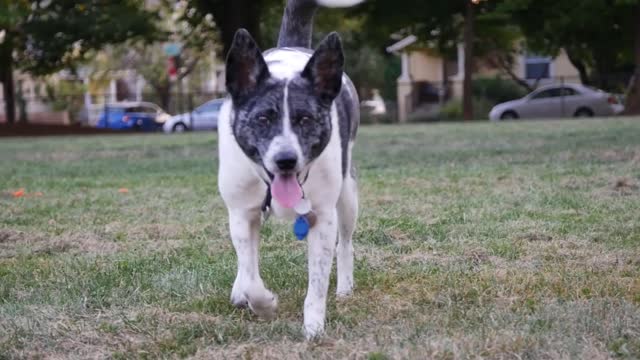Premium Only Content

Your dog is a good boy, but this is not necessarily because of his breed.
Your dog is a good boy, but this is not necessarily because of his breed.
Labrador retrievers fetch, border collies herd, huskies howl: it is conventional wisdom that many dog breeds act in certain ways because they have been bred to do so over many generations.
But a new study to be published in the journal Science has found that while some dog behaviors are indeed associated with specific breeds, breed plays a smaller role than conventional wisdom holds.
"We found that things like short-haired German pointers were a little more likely to point, or golden retrievers were a little more likely to retrieve, or huskies more likely to howl, than the general population of dogs," says Kathryn Lord, a researcher at UMass Chan Medical. School and author of the study.
The researchers interviewed the owners of more than 18,000 dogs and analyzed the DNA of about 2,100 animals to see if physical characteristics and behaviors can be correlated with dog breeds.
Overall, the study found that about 9 percent of the variation in an individual dog's behavior can be explained by its breed.
Border collies, for example, were more likely to respond to human direction, a trait called "obedience." Owners of beagles, bloodhounds, coonhounds, and Siberian huskies will not be surprised to learn that these breeds had a tendency to howl.
The same was true of mixed-breed dogs, the researchers found - the higher the percentage of border collie in a mutt, the more responsive it was to human commands.
"From a genetic point of view, that's fantastic. It means that there are real behavioral differences that are linked to the breeds that we can study," says Elinor Karlsson, professor at UMass Chan School of Medicine and another author of the study.
In individual dogs of the same breed, the researchers found huge variations in behavior.
For example, although golden retrievers are generally more likely to fetch than many other dogs, there are many lazy golden retrievers who sit and watch their owners throw tennis balls uselessly.
And no behavior is unique to a single breed, the researchers said. Short-haired German pointers are not the only dogs that point.
The most likely explanation for the relatively low correlation between behavior and breed, the paper's authors said, is that many modern dog breeds are relatively new, in the evolutionary scope of things.
Organized dog breeding, with kennel clubs and other groups that regulate physical characteristics and track lineage, has existed in its current form only since the mid-19th century.
On the other hand, humans have been helping shape dog behavior for thousands of years , the researchers said - first by giving dogs useful food and shelter, allowing them to have puppies more easily, and then by intentionally breeding.
"The thing about complex traits is that selecting for them takes time," Karlsson says. "And so the idea that they were bred in the last 160 years, when these breeds emerged, didn't make sense."
To create their data set, the researchers created a website called Darwin's Ark, which allows dog owners to submit data about their dogs and answer questions, both about physical characteristics-how tall the dog is, how long the coat is-and about their dogs ' behavior: do they shake toys? Do they avoid getting wet? Do they howl?
The researchers say they hope the article can help aspiring dog owners change their mindsets about how to choose a dog.
"I don't think we should really decide that breeds are the things that will tell us whether we'll be happy with a dog or whether a dog will be happy with us," says Marjie Alonso, another of the study's authors and executive director of the IAABC Foundation, an animal training organization.
Instead, she suggests that potential owners make a list of what they would like to do with a dog and try to find a dog that meets those needs.
"We have to accept that our dogs are individuals.
-
 LIVE
LIVE
Talk Nerdy 2 Us
2 hours ago💻 From ransomware to global regulations, the digital battlefield is heating up!
446 watching -
 LIVE
LIVE
I_Came_With_Fire_Podcast
5 hours agoHalf the Gov. goes MISSING, Trump day 1 Plans, IC finally tells the Truth, Jesus was NOT Palestinian
221 watching -
 4:11:49
4:11:49
Nerdrotic
7 hours ago $2.26 earnedThe Best and Worst of 2024! Sony Blames Fans | Batman DELAYED | Nosferatu! |Friday Night Tights 334
106K27 -
 7:55:51
7:55:51
Dr Disrespect
11 hours ago🔴LIVE - DR DISRESPECT - WARZONE - SHOTTY BOYS ATTACK
181K26 -
 1:30:23
1:30:23
Twins Pod
10 hours agoHe Went From MARCHING With BLM To Shaking Hands With TRUMP! | Twins Pod - Episode 45 - Amir Odom
104K24 -
 1:02:30
1:02:30
Exploring With Nug
12 hours ago $0.33 earned2 Duck Hunters Missing After Kayak Capsizes!
37.7K2 -
 46:48
46:48
Mally_Mouse
5 hours agoLet's Hang!! -- Opening Christmas gifts from YOU!
51.5K -
 44:55
44:55
Athlete & Artist Show
20 days ago $1.84 earnedNHL 4 Nations Snubs, Was Hawk Tuah Coin A Scam?
53.5K -
 33:47
33:47
Stephen Gardner
11 hours ago🔥Pentagon Whistleblower UNLEASHES on Biden and Obama!
108K172 -
 2:20:30
2:20:30
The Dilley Show
12 hours ago $3.75 earnedRoger Stone in Studio plus Q&A Friday! w/Author Brenden Dilley 12/27/2024
90.4K20